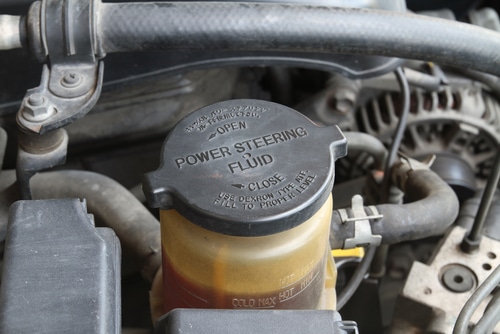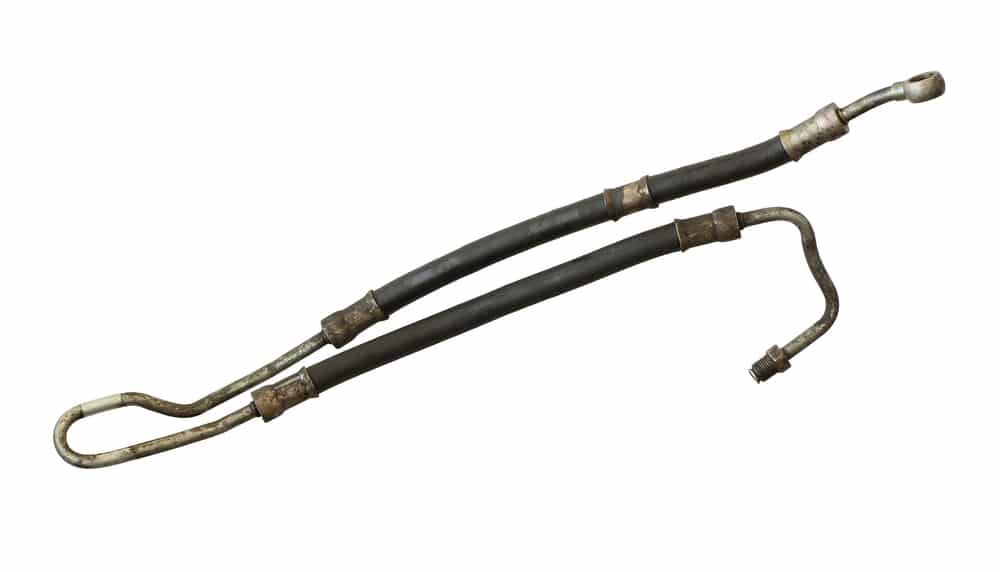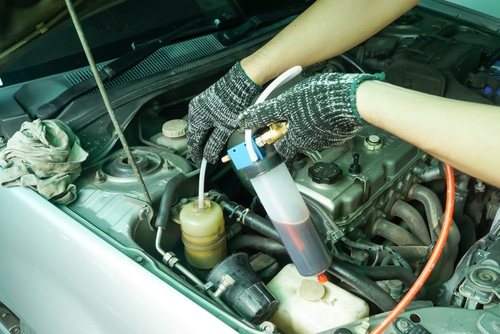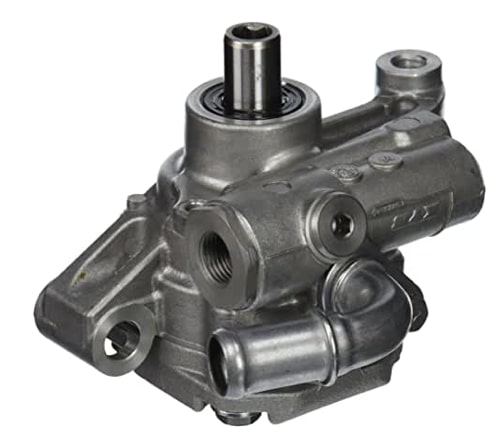
One of the most common problems that can happen with a vehicle over time is it’ll begin leaking power steering fluid.
Without the power steering system, your Atlas would be very difficult to drive. Most of the weight of the vehicle is absorbed by the power steering system, making it feel much lighter than it really is.
Key Takeaways
- Awareness of causes and symptoms of power steering fluid leaks
- Early detection and repair can save time, money, and protect your vehicle
- Regular maintenance and preventative measures can extend the life of your power steering system
Causes of Power Steering Fluid Leak
In your Volkswagen Atlas, a power steering fluid leak can happen for various reasons. This section will discuss the possible causes of such leaks and will focus on the following sub-sections: Damaged Steering Pump, Worn-Out Hoses, Seal Failure, and Loose Connections.
Damaged Steering Pump

A damaged steering pump is a common cause for power steering fluid leaks. Your Atlas’s power steering pump pushes the hydraulic fluid through power steering hoses and through the steering rack or gearbox.
It is turned by the serpentine belt attached to the engine. The pump can wear down over time. When it does, it can begin to leak power steering fluid under the engine.
Worn-Out Hoses

The hoses in your power steering system can become worn-out over time. As they deteriorate, they are more likely to develop cracks and holes, leading to a fluid leak. It’s essential to inspect the hoses regularly for signs of damage or wear, and replace them when necessary to avoid potential leaks.
Seal Failure
Seal failure is another reason for power steering fluid leaks in your Volkswagen Atlas. The seals in your power steering system can suffer from natural wear and tear due to long-term usage.
If the seals fail, power steering fluid can begin to leak from the affected area. In some cases, the power steering can also be damaged by unfiltered, impure power steering fluid.
Using high-quality power steering fluid and servicing the system regularly can help prevent leaks caused by seal failure.
Symptoms of Power Steering Leak
Difficulty in Steering
When your Volkswagen Atlas experiences a power steering fluid leak, you may notice increased difficulty in steering.
Turning the wheel may require more force than usual, especially during low-speed maneuvers or when the vehicle is stationary.
This happens because the power steering system relies on hydraulic pressure provided by the fluid to assist in steering, and a leak reduces the system’s overall efficiency.
Whining Noise
Another symptom of a power steering fluid leak is a whining noise coming from under the hood. This is perhaps, the most noticeable symptom of a failing power steering pump.
This noise typically becomes more prominent when you turn the steering wheel, as it puts additional strain on the power steering pump.
The cause of the noise is often due to low fluid levels, which reduces the lubrication and cooling capabilities of the power steering system.
Fluid Stains
One of the most obvious symptoms of a power steering leak is fluid stains on the ground beneath your vehicle. If you notice dark, oily spots or puddles under your Atlas, especially near the front area of the engine compartment, it may indicate a leaking power steering system.
It’s important to address this issue promptly to prevent further damage to the power steering components.
Low Fluid Levels
Regularly checking your Atlas’s power steering fluid levels can help you detect a leak before it leads to more serious issues.
Power steering fluid is typically red or pink, making it easy to distinguish from other automotive fluids. If you notice that the fluid level is consistently lower than it should be, despite topping it off, there is likely a leak within the system.
Be sure to monitor and address the problem to maintain proper steering performance and longevity of the power steering components.
Fixing Power Steering Fluid Leaks
Inspect the System

Before you start repairing your Volkswagen Atlas’s power steering fluid leak, it’s essential to inspect the entire system. Carefully examine the power steering hoses and connections for any obvious signs of leakage. Pay special attention to the areas where the metal part of the hose meets the rubber.
Replace Damaged Components
If you find any damaged or worn-out components during your inspection, such as the power steering hose or seals in the steering assembly, it’s crucial to replace them. Damaged parts can lead to additional problems and may result in more extensive (and expensive) repairs if not addressed promptly.
Tighten Connections
Sometimes, power steering fluid leaks can be caused by loose connections. Take the time to check all connections within the system, including the hose clamps securing the power steering hoses to the pump and steering rack or gear. If you find any loose or improperly secured connections, simply tighten them to help prevent leaks.
Refill Fluid
Once you’ve identified and addressed the source of the power steering fluid leak, it’s time to refill the system with the appropriate fluid. Be sure to consult your Volkswagen Atlas’s owner’s manual to determine the correct type and quantity of power steering fluid to use.
Fill the reservoir to the recommended level, and don’t forget to check the fluid level periodically to ensure that you’ve adequately resolved the issue.
Preventive Measures

Taking preventive measures can significantly reduce the chances of a power steering fluid leak in your Volkswagen Atlas. Here are a few sub-sections with tips on how to prevent such leaks.
Regular Inspection
Regularly inspect your power steering system components, especially the hoses, seals, and connections. Look for any signs of wear, cracks, or swelling on the hoses.
Detecting early signs of potential leaks will allow you to address the issue before it worsens. Replace any worn or damaged components promptly to maintain the optimal performance of your power steering system.
Quality Fluids
Using high-quality power steering fluid is essential in prolonging the life of your power steering system. Cheaper fluids might save you some money initially, but they can lead to more significant issues down the line, like leaks, corrosion, or failure of the system.
Always choose a fluid that meets Volkswagen’s specifications for your Atlas, and check the owner’s manual for the recommended type.
Proper Maintenance
Regular maintenance is key to keeping your Atlas’s power steering system operating efficiently and preventing leaks. Schedule routine checkups and services, as recommended by Volkswagen, to ensure your system is in good condition. This includes tasks like:
- Checking the fluid level and topping it up as needed
- Inspecting the power steering belt for wear or damage and adjusting or replacing it if necessary
- Regularly cleaning the entire system and ensuring all seals are intact
By following these preventive measures, you can help maintain your Volkswagen Atlas’s power steering system in top condition, minimizing the potential for fluid leaks and the associated costs and inconveniences.
Conclusion
Leaks in your Volkswagen Atlas’s power steering fluid can be a frustrating issue that impacts the vehicle’s performance. By identifying the root cause of the issue, you can prevent further damage and ensure the smooth operation of your truck.
The most common causes of power steering fluid leaks include a worn-out power steering pump, a malfunctioning rack or gearbox, or issues with the power steering hoses. Inspecting these components regularly will aid in early detection of potential leaks.
When you suspect a leak, it is essential to address the issue as soon as possible. Frequent checks of the power steering fluid reservoir and observance of any unusual sounds or performance issues related to steering will help you stay informed about the state of your Atlas’s power steering system.
If you are unable to locate the source of the leak yourself, seeking professional assistance is recommended. A qualified mechanic can diagnose and repair the problem efficiently, preventing further damage and ensuring the safety and reliability of your vehicle.
